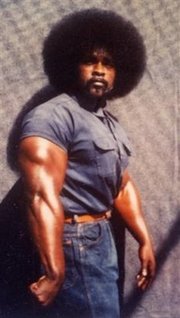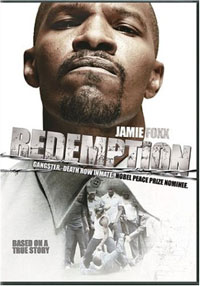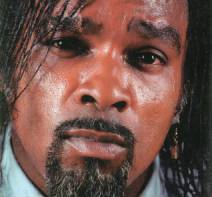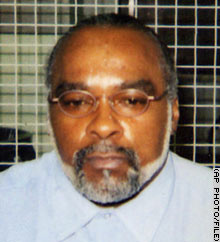Tookie Williams and "Redemptive Transition"
Tailor Made for The Wretched, Available for Everybody
For Sunday January 8, 2006
Lectionary Readings (Revised Common Lectionary, Year B)
Genesis 1:1–5
Psalm 29
Acts 19:1–7
Mark 1:4–11
 |
Williams age 29. |
After twenty-five years of appeals and delays, on December 13 at 12:01 AM the state of California executed Stanley "Tookie" Williams by lethal injection. He was 51. Williams, who maintained that he was innocent, was convicted in 1979 of murdering four people. For a dozen years he distinguished himself as a violent inmate on death row at San Quentin State Prison. Around 1992 Williams then repudiated his life as a gang member, wrote children's books, gave speeches, and was even the subject of a Hollywood movie starring Jamie Foxx called Redemption: The Stanley "Tookie" Williams Story (2004). Skeptics insist that his "conversion" was a shameless ploy.
Only God knows Williams's heart (or yours or mine). I pray for his soul, and pray that he prays for mine. But I was interested to read an interview that he gave to Kat Aaron of KBAI Radio in Pacifica, California, only a few hours before his execution:1
I got up this morning, I cleansed myself, I prayed, I exercised, and now I'm talking to you—or prior to talking to you, I was talking to my mother. Of course, she is quite encouraging, spiritual, and so am I. And my lack of fear of this barbaric methodology of death, I rely upon my faith. It has nothing to do with machismo, with manhood, or with some pseudo former gang street code. This is pure faith, and predicated on my redemption. So, therefore, I just stand strong and continue to tell you, your audience and the world that I am innocent and, yes, I have been a wretched person, but I have redeemed myself. And I say to you and all those who can listen and will listen that redemption is tailor-made for the wretched, and that's what I used to be... [Then asked how he would like to be remembered]: I have been asked the same query not too long ago, and I said just one word, just one word can sum it up [inaudible] in a nutshell, and that is: redemption. I can say it no better than that. That's what I would like the world to remember me. That's how I would like my legacy to be remembered as: a redemptive transition, something that I believe is not exclusive just for the so-called sanctimonious, the elitists. And it doesn't—is not predicated on color or race or social stratum or one's religious background. It's accessible for everybody. That's the beauty about it. And whether others choose to believe that I have redeemed myself or not, I worry not, because I know and God knows, and you can believe that all of the youths that I continue to help, they know, too. So with that, I am grateful. So I thank you for the opportunity, and I say to you and everyone else, god bless. So take care.
Whether a saint or a charlatan, Williams's last words illuminate the heart of the Gospel and the Scriptures for this week.
 |
The film. |
The Old Testament reading comes from the very first page of the Bible. In this poetic picture of creation, at the end of each "day" we read six times the rhythmic refrain how "God saw that it was good." The seventh day culminates with an unequivocal verdict, "God saw all that He had made, and it was very good" (Genesis 1:31). But only five pages into the story humanity had experienced a catastrophic reversal: "The Lord saw how great man's wickedness on the earth had become, and that every inclination of the thoughts of his heart was only evil all the time" (6:5). Christians call this part of the story's plot "original sin," and although we do not know how, when or why this tragedy happened, we can say a few things with confidence.
G.K. Chesterton once observed that although Christians affirm any number of doctrines that you cannot "prove," the idea that people are sinful is the most empirically verifiable of all ideas. If people are inherently and essentially good, then why is our world characterized by such barbaric cruelty, globalized violence, unfettered greed, and exponential inequities between the rich and poor? Clearly, something has gone very badly awry with humanity. The notion of original sin, Chesterton said, explains why, on a beautiful summer Sunday afternoon, two young children would decide to torture a cat. Or why a Tookie Williams would blow away four people with a shotgun for chump change.
Experience also demonstrates that people do not always sink to their moral nadir. It would be ridiculous to argue that people are only evil or even mostly evil. We often encounter truth, beauty, and goodness in one another, distinct echoes of that first page in Genesis with its sevenfold refrain. "The sane man," said Chesterton, "knows that he has a touch of the beast, a touch of the devil, a touch of the saint, a touch of the citizen. Nay, the really sane man knows that he has a touch of the madman." We are, then, a mixture of both the good we read about on the first page of Genesis and the chilling evil that we encounter five pages later.
 |
Williams. |
We are not talking here about other people, about death row inmates, or your crazy uncle. We are talking about our very own selves, for as Solzhenitsyn observed, this disconcerting but empirically verifiable mixture of good and evil cuts straight through the center of every human heart. The ultimate battle, compared to which every other struggle is merely superficial, observed Tookie Williams in another interview (June 19, 2005), is what he called "the enemy within oneself."2 To win this battle signals life; to lose it dooms us to a downward spiral toward death. In my best moments I realize that I too might have become a Tookie Williams—if I had grown up in a different family, if I inherited an unfortunate roll of the genetic dice, if I suffered the full consequences of every foolish decision I ever made, or if for some inexplicable reason I succumbed to every impulse to greed, lust, anger, or hatred that my brain's neurons ever fired. Orginal sin is hardly a cause for finger-pointing.
But nor is it a cause for pessimism. Contrary to misunderstandings that characterize the Christian affirmation about sin as misanthropic, Chesterton was also right to declare this doctrine not only the most empirically verifiable but also the most hopeful of ideas. The explanatory power of the doctrine of sin permits us to be ruthlessly realistic about the world in general and about our personal selves in particular. A sober acknowledgment of my sins is the first step toward liberation from my endless strategies of denial and self-justification, along with my pathological need to "fix" or control others. Freedom from delusion, the joy of forgiveness, and tenderness towards ourselves and others all result from the notion of sin.
The Gospel for this week takes us to the very first page of Mark, where we read about the eccentric John "baptizing in the desert region and preaching a baptism of repentance for the forgiveness of sins" (1:4). People flocked to the desert, "confessing their sins." Remarkably, Jesus included himself in this penitent crowd that John rebuked as a "brood of vipers": "Jesus came from Nazareth of Galilee and was baptized by John in the Jordan." Why did Jesus the greater undergo baptism by John the lesser? With this symbolic act Jesus inaugurated his public ministry by identifying with the faults, failures and moral frailty of broken people. Before too long the sanctimonious religious crowd derided him as a "friend of gluttons and sinners."
The repentance that John calls for triggers what Tookie Williams called a "redemption transition." Consisting of more than remorse or regret, genuine repentance gives evidence of a change of heart that leads to a change of actions. By God's grace, we turn around and head in a different direction. As such repentance requires both singular acts and a lifelong habit or mindset. We confess particular sinful actions and attitudes, and remain ever mindful of our fallen nature. Rather than a misanthropic denunciation, repentance is a life affirming declaration because it invites us to make a new start no matter how often or how badly we have failed.
 |
Stanley "Tookie" Williams (1953–2005). |
Christians thus celebrate a "spirituality of imperfection" (Chryssavgis) that is rooted in the desert monastics of the fourth century. These colorful oddballs took their inspiration from that first desert baptizer John. In their own unique way they had committed themselves to a "redemption transition," to human healing rather than to theological abstractions, and by experience they discovered the breadth and depth of the battle that rages in the deepest recesses of the human heart. But they were not embarrassed by what they discovered, nor did they engage in shame and blame. Rather, they grew comfortable with the theological grammar of Genesis 6:5, and the healing power of heeding John the Baptist's call to lifelong repentance. Refreshingly candid, ruthlessly honest about the interior landscape of the desert in their own hearts, unfailingly tender towards others, and patient toward all people, these eccentric ascetics speak an ancient wisdom that commends itself to our modern world. Writing in the seventh century, St. Maximos the Confessor concluded: "The person who has come to know the weakness of human nature has gained experience of divine power. Such a person never belittles anyone...He knows that God is like a good and loving physician who heals with individual treatment each of those who are trying to make progress."
For further reflection:
* What do you make of Williams's "conversion?" His detractors?
* Why do you think Jesus was baptized with "a brood of vipers?"
* What has been your experience of the mixture of good and evil in people?
* Do you find the idea of a "spirituality of imperfection" helpful?
[1] http://www.democracynow.org/article.pl?sid=05/12/13/1525206#transcript.
[2] http://www.finalcall.com/artman/publish/article_2079.shtml.





